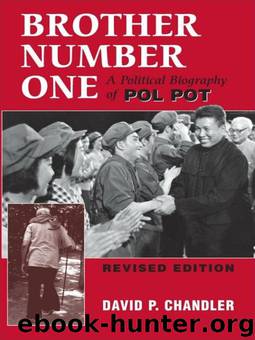Brother Number One: A Political Biography of Pol Pot by David P. Chandler

Author:David P. Chandler [Chandler, David P.]
Language: eng
Format: mobi
Tags: Non-Fiction, Biography, History
ISBN: 9780813335100
Google: TaY_BAAAQBAJ
Goodreads: 433358
Publisher: Westview Press
Published: 1992-10-19T11:00:00+00:00
Tuol Sleng. Photo by Bruce Sharp. Copyright by Bruce Sharp.
An interrogation room at Tuol Sleng. When Vietnamese troops arrived in Phnom Penh on January 7, 1979, the bodies of the final victims were still shackled to the bed frames in these cells. SOURCE: Ministry of Information and Culture, Phnom Penh. Copyright 1991 Bruce Sharp.
In late 1975 and early 1976, those brought in to be questioned and smashed tended to be either former Lon Nol soldiers, Cambodians educated in North Vietnam, stray foreigners, or former revolutionaries who had made life difficult for cadre in the countryside. In May 1976 a military unit stationed in Phnom Penh, Division 170, exploded some ordnance—ei—ther in error or as part of a demonstration—near the party’s headquarters. The soldiers, it seems, wanted to be demobilized and allowed to return home. Their commanders were also rounded up and questioned. The most important of these was the political commissar Prom Sombat (Chan Chakrei), a thirty-three-year-old former monk who soon was designated by the Roman numeral “I” in S-21 in a “conspiracy” that extended by the end of the year to twenty coded figures. Chakrei confessed to working for the CIA, the Vietnamese, and the Khmer Serei (“Free Khmer”), a pro-American, anti-Sihanouk grouping that had been active in prerevolutionary times. Some of these admissions (but which ones?) may have been true, but Chakrei also claimed, as he was told to do, that the Khmer Serei had Soviet and Vietnamese Communist backing. This absurd connection was typical of the statements Duch demanded and then transmitted to Pol Pot and other leaders.
Chakrei’s arrest prompted Duch to compose memoranda to a “Respected Older Brother” (probably Son Sen) pointing out what he saw as the collusion of the Vietnamese Communists and the CIA in conspiracies against the party. These links became the leitmotif of confessions in 1977 and 1978. Cadre in the eastern zone came under special scrutiny, because—as Steve Heder has suggested—the eastern zone cadre, led by the party secretary there, Sao Phim, wanted to assume a more vigorous defensive military posture toward Vietnam than the party’s leaders wanted. Pol Pot and his colleagues were still hoping that Vietnam would collapse under its own weight.25
Download
This site does not store any files on its server. We only index and link to content provided by other sites. Please contact the content providers to delete copyright contents if any and email us, we'll remove relevant links or contents immediately.
| China | India & South Asia |
| Japan |
Fanny Burney by Claire Harman(26581)
Empire of the Sikhs by Patwant Singh(23057)
Out of India by Michael Foss(16837)
Leonardo da Vinci by Walter Isaacson(13291)
Small Great Things by Jodi Picoult(7099)
The Six Wives Of Henry VIII (WOMEN IN HISTORY) by Fraser Antonia(5484)
The Wind in My Hair by Masih Alinejad(5070)
A Higher Loyalty: Truth, Lies, and Leadership by James Comey(4937)
The Crown by Robert Lacey(4784)
The Lonely City by Olivia Laing(4783)
Millionaire: The Philanderer, Gambler, and Duelist Who Invented Modern Finance by Janet Gleeson(4446)
The Iron Duke by The Iron Duke(4334)
Papillon (English) by Henri Charrière(4238)
Sticky Fingers by Joe Hagan(4171)
Joan of Arc by Mary Gordon(4077)
Alive: The Story of the Andes Survivors by Piers Paul Read(4009)
Stalin by Stephen Kotkin(3937)
Aleister Crowley: The Biography by Tobias Churton(3621)
Ants Among Elephants by Sujatha Gidla(3449)
